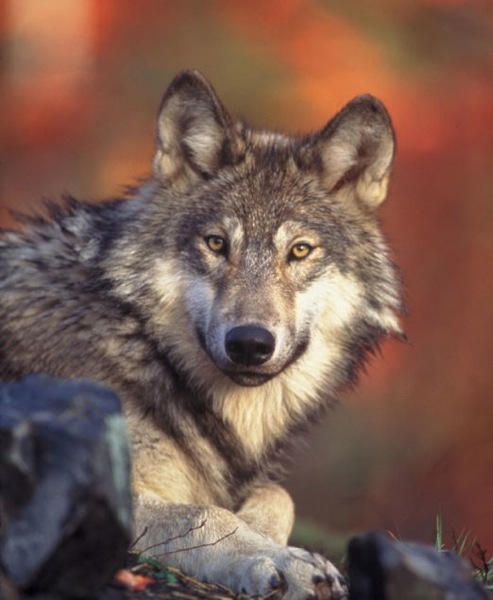
The debate about wolves is picking up again, due to the ill-advised decision of the Obama administration to delist wolves from the Endangered Species Act throughout the northern Rockies of the United States.
Mother Jones has an excellent photoessay entitled 10 Reasons We Need Wolves. It was first put up about a year ago, but was recently revived by reader comments. It pairs beautiful pictures, with information and literature on the importance of wolves to ecosystem health.
According to Mother Jones, wolves help:
* regulate ecosystems
* promote biodiversity
* enrich soil nutrients
* feed scavengers
* keep coyotes in check
* suppress disease transmission in deer and elk
* keep down overgrazing
* combat climate change (really!), and
* generate ecotourism
That is quite a list, and the photoessay is definitely worth a look!
The comments from wolf opponents are equally interesting — wolves are a threat to personal and public safety, wolves are an economic threat to farmers and ranchers, only humans can keep the “balance of nature”, wolves represent government intrusion, and to top it off, they are vicious killing machines.
As someone who has worked on the ethics of wolf recovery for over a decade, I have heard just about every argument and justification for exterminating, managing or protecting wolves (just a few of the options).
When one looks at wolve’s ecological value, it is clear that wolves are indispensable apex predators with strong positive impacts on their ecosystems. Wolves are also an “umbrella species” that positively represent the importance of wildness. They motivate people to protect the habitat that wildlife needs to thrive.
In terms of social values, wolves pose no reasonable threat to personal or public health. Wolf attacks on people are minuscule in number, especially when compared to car accidents, dog bites and lightening strikes. In terms of economics, Wolves count for less than 1% of livestock losses throughout the US, and have virtually no impact on farming or ranching as a whole. Wolves also promote ecotourism and local economic livelihoods.
Unfortunately, while The Guardian photo essay focuses on their ecological and social value, it leaves out wolves moral value. Allow me to fill in the gap by noting three examples of this.
First, wolves are feeling, thinking and social animals, aware of their surroundings, themselves and each other. They live their lives for themselves, and were not placed on the earth for humans to use or abuse however we please. This is what is known as the intrinsic value of wolves, and it is akin to the intrinsic value we claim for ourselves.
Second, wolves are an indicator that we are learning to live in a sustainable way. When we can share the landscape with large predators like wolves, then we have per force taken important steps towards living in greater harmony with the natural world. A rural or wild landscape without wolves in the historical range, is one operating below par with respect to biodiversity and sustainability.
Third, our relationship with wolves says much about our moral health. Gandhi once said you can judge a civilization by how it treats its animals. Wolves have their own intrinsic value, apart from any use we have for them or abuse we heap upon them. Protecting the well being of wolves and their place in the landscape is a sign of the moral maturation of our society.
From a policy perspective, it is important to note that the baseline threat to wolves is from people and has everything to do our ethics. Human depredations on wolves, a loathing of predators, and the belief that wolves are just another resource for us to use as we wish, are all rooted in duelling ethical perspectives on animals and the rest of nature. Wolf recovery has ecological and social dimensions to be sure. But it is primarily a moral argument about whether we have obligations to other creatures and responsibilities to coexist with them.
What this means in policy terms is simple. We must address the moral dimensions of wolf recovery, as much as we do its ecological and social dimensions. To fail to do so is to fundamentally misunderstand the nature of the controversy, or the resolution to human/wolf conflicts.
Image: Gary Kramer, US Fish and Wildlife Service